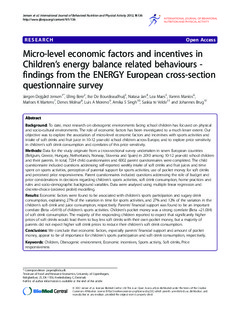| dc.contributor.author | Jensen, Jørgen D. | |
| dc.contributor.author | Bere, Elling | |
| dc.contributor.author | De Bourdeaudhuij, Ilse | |
| dc.contributor.author | Jan, Nataša | |
| dc.contributor.author | Maes, Lea | |
| dc.contributor.author | Manios, Yannis | |
| dc.contributor.author | Martens, Marloes K. | |
| dc.contributor.author | Molnar, Denes | |
| dc.contributor.author | Moreno, Luis A. | |
| dc.contributor.author | te Velde, Saskia J. | |
| dc.contributor.author | Brug, Johannes | |
| dc.date.accessioned | 2013-01-16T11:49:06Z | |
| dc.date.available | 2013-01-16T11:49:06Z | |
| dc.date.issued | 2012 | |
| dc.identifier.citation | Jensen, J. D., Bere, E., De Bourdeaudhuij, I., Jan, N., Maes, L., Manios, Y., . . . Brug, J. (2012). Micro-level economic factors and incentives in children's energy balance related behaviours - findings from the ENERGY european cross-section questionnaire survey. International Journal of Behavioral Nutrition and Physical Activity, 9 doi: 10.1186/1479-5868-9-136 | no_NO |
| dc.identifier.issn | 1479-5868 | |
| dc.identifier.uri | http://hdl.handle.net/11250/139025 | |
| dc.description | Published version of an article from the journal: International Journal of Behavioral Nutrition and Physical Activity. Also available from BMC: http://dx.doi.org/10.1186/1479-5868-9-136
Open Access | no_NO |
| dc.description.abstract | Background
To date, most research on obesogenic environments facing school children has focused on physical and socio-cultural environments. The role of economic factors has been investigated to a much lesser extent. Our objective was to explore the association of micro-level economic factors and incentives with sports activities and intake of soft drinks and fruit juice in 10-12 year-old school children across Europe, and to explore price sensitivity in children’s soft drink consumption and correlates of this price sensitivity.
Methods
Data for the study originate from a cross-sectional survey undertaken in seven European countries (Belgium, Greece, Hungary, Netherlands, Norway, Slovenia and Spain) in 2010 among 10-12 year-old school children and their parents. In total, 7234 child questionnaires and 6002 parent questionnaires were completed. The child questionnaire included questions addressing self-reported weekly intake of soft drinks and fruit juices and time spent on sports activities, perception of parental support for sports activities, use of pocket money for soft drinks and perceived price responsiveness. Parent questionnaires included questions addressing the role of budget and price considerations in decisions regarding children’s sports activities, soft drink consumption, home practices and rules and socio-demographic background variables. Data were analysed using multiple linear regression and discrete-choice (ordered probit) modelling.
Results
Economic factors were found to be associated with children’s sports participation and sugary drink consumption, explaining 27% of the variation in time for sports activities, and 27% and 12% of the variation in the children’s soft drink and juice consumption, respectively. Parents’ financial support was found to be an important correlate (Beta =0.419) of children’s sports activities. Children’s pocket money was a strong correlate (Beta =21.034) of soft drink consumption. The majority of the responding children reported to expect that significantly higher prices of soft drinks would lead them to buy less soft drinks with their own pocket money, but a majority of parents did not expect higher soft drink prices to reduce their children’s soft drink consumption.
Conclusions
We conclude that economic factors, especially parents’ financial support and amount of pocket money, appear to be of importance for children’s sports participation and soft drink consumption, respectively.
Keywords: Children; Obesogenic environment; Economic incentives; Sports activity; Soft drinks; Price responsiveness | no_NO |
| dc.language.iso | eng | no_NO |
| dc.publisher | Biomed Central | no_NO |
| dc.title | Micro-level economic factors and incentives in children's energy balance related behaviours: Findings from the ENERGY European cross-section questionnaire survey | no_NO |
| dc.type | Journal article | no_NO |
| dc.type | Peer reviewed | no_NO |
| dc.subject.nsi | VDP::Medical disciplines: 700::Health sciences: 800::Nutrition: 811 | no_NO |
| dc.source.pagenumber | 12 p. | no_NO |
| dc.source.volume | 9 | no_NO |
| dc.source.journal | International Journal of Behavioral Nutrition and Physical Activity | no_NO |
| dc.source.issue | 136 | no_NO |
| dc.identifier.doi | 10.1186/1479-5868-9-136 | |
